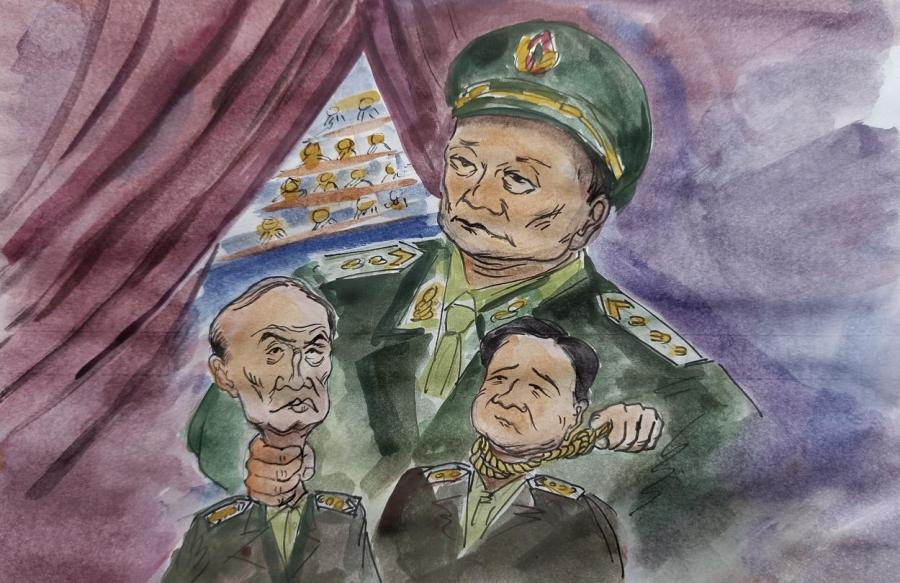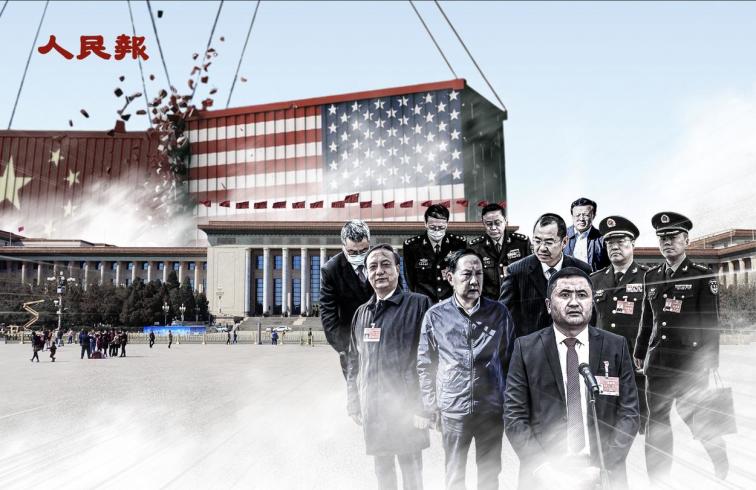Image: He Weidong, Zhao Keshi, and other Xi Jinping loyalists being purged by Zhang Youxia. (Qingyu / People News graphic)
[People News] Recently, the most significant political event in China was the simultaneous expulsion from the Party and military of nine generals—including Politburo member and Central Military Commission (CMC) vice chairman He Weidong—who have now been transferred to the military procuratorate for prosecution.
On October 17, the CCP Ministry of National Defense’s “Authoritative Releases” column published an article titled “He Weidong, Miao Hua, and Eight Others Severely Violated Discipline and Law and Have Been Expelled from the Party and the Military.” When I visited the same section on October 21, the article had disappeared. Although the title could still be found via the search function, it no longer appeared under “Headlines,” “Leadership Activities,” or “Hot Topics.” Clearly, this was a deliberate act to downplay the event.
The Ministry spokesperson’s announcement also concealed two key facts: that all nine were full generals, and that the CMC had revoked their general ranks.
On October 18, the CMC’s official newspaper PLA Daily published an editorial titled “Unswervingly Push the Anti-Corruption Fight in the Military to the End.” This editorial, too, omitted major information.
Despite the gravity of the news, from October 17 to 21, the CCP’s flagship news program Xinwen Lianbo (CCTV Evening News) did not mention it at all—as if this world-shaking event never happened.
This article reveals three truths the CCP doesn’t want you to know about the nine generals.
I. Why Hide That All Nine Were Full Generals and That Their Ranks Were Revoked?
The CCP’s military hierarchy has three general ranks—lieutenant general, major general, and full general, the last being the highest. According to CCP regulations, the rank of full general “is conferred by approval of the chairman of the Central Military Commission.”
Each of these nine generals’ ranks was personally approved and conferred by Xi Jinping, as follows:
-
He Weidong – Army General, conferred by Xi on Dec. 12, 2019
-
Miao Hua – Navy Admiral, July 31, 2015
-
He Hongjun – Army General, July 9, 2024
-
Wang Xiubin – Army General, July 5, 2021
-
Lin Xiangyang – Army General, Sept. 6, 2021
-
Qin Shutang – Army General, Jan. 21, 2022
-
Yuan Huazhi – Navy Admiral, Jan. 21, 2022
-
Wang Houbin – Rocket Force General, July 31, 2023
-
Wang Chunning – Armed Police General, Dec. 18, 2020
In addition, five other generals investigated after the 20th Party Congress were also conferred by Xi:
-
Zhou Yaning – Rocket Force General, Dec. 12, 2019
-
Li Yuchao – Rocket Force General, Jan. 21, 2022
-
Wei Fenghe – General, Nov. 23, 2012
-
Ding Hanglai – Air Force General, July 31, 2019
-
Li Shangfu – Army General, July 31, 2019
In other words, since the 20th Party Congress ended in 2022, 14 generals personally promoted by Xi have been taken down for “serious violations of discipline and law.”
Why did the CCP hide the fact that these nine were generals and that their ranks were revoked? There are three possible reasons:
-
To shield Xi Jinping from embarrassment.
After securing his third term at the 20th Congress, Xi reached the peak of power, hailed by officials as the “People’s Leader,” “Great Leader,” “Commander-in-Chief,” and “Helmsman of the New Era.” Yet less than three years later, 14 generals he personally promoted have fallen like dominoes—an unbearable humiliation. -
To cover up the systemic corruption among senior officers.
One fallen general at a key post implies several others tied to him. With fifteen top generals down, dozens more lieutenant generals and major generals may be implicated. Reports suggest additional generals—such as Wang Renhua, Xu Xueqiang, Xu Qiling, Xu Xisheng, Xiao Tianliang, Liu Qingsong, Wang Haijiang, Huang Ming, Wang Qiang, Xu Deqing, Han Weiguo, and Zhang Hongbing—are also under investigation.Even Xi’s closest aides have been affected:
-
Qin Shengxiang, Xi’s first CMC General Office director (later Navy commissar),
-
Zhong Shaojun, Xi’s second office director (later National Defense University commissar), and
-
Fang Yongxiang, Xi’s third office director,
are reportedly dismissed, reassigned, or under investigation.
On Oct. 18, U.S.-based commentator Cai Shenkun revealed: “I’ve heard that over a hundred generals are still lined up for investigation. The so-called ‘Xi Army’ formed after the 20th Congress has been basically annihilated.”
-
-
To prevent shaking morale within the military.
Rising from a low-ranking soldier to full general is extraordinarily rare. Now, a series of top generals personally promoted by Xi are falling for “disloyalty” and “massive corruption.” Such news could demoralize the rank and file, who may begin questioning the legitimacy of their leaders—and even defy orders. Hence, the CCP tries to “paper it over” by omitting the generals’ ranks altogether.
II. What Were the “Serious Violations” of the Nine Generals?
The Ministry’s announcement implied mainly economic crimes of “especially huge amounts.”
But corruption among top brass is endemic, not exceptional. If it were merely about money, these cases would not have warranted such a purge.
When Xi purged former CMC vice chairmen Guo Boxiong and Xu Caihou, he said:“Their corruption was shocking, but that wasn’t the core issue—the key was that they crossed political red lines.”
Thus, the real issue with these nine generals was political disloyalty.
The PLA Daily editorial accused them of:“Collapsed faith, betrayal of loyalty, grave betrayal of the Party Central Committee and the CMC’s trust, severe damage to the principle of Party control over the military and the CMC chairman responsibility system, serious harm to the political ecology of the troops, and great damage to the unity and morale of all officers and soldiers.”
These are clearly political charges—but how exactly did they “betray loyalty” or “undermine the chairman system”? The editorial didn’t explain.
However, clues have emerged.
A WeChat article on July 23, titled “Eradicating Miao Hua’s Poison: Political Cadres Need Bone-Scraping Self-Revolution,” published by the Huashan Qiongjian account (affiliated with the China Military Culture Forum, which itself operates under the CMC Political Work Department), detailed Miao Hua’s “four crimes”:
-
Hypocrisy and factionalism. Publicly preaching “absolute loyalty” while privately scheming for personal power; pretending loyalty but plotting ambition.
-
Corrupting political discipline. Turning “political work” into business, abusing promotions for personal gain, and destroying political ecology.
-
Forming cliques. Building personal networks, cultivating factions, undermining the Party’s absolute command of the army.
-
Trading power for money. Treating authority as a personal tool, converting military assets into private gain, and taking massive bribes.
The article suggested that Miao Hua, He Weidong, and others formed a factional alliance in pursuit of personal political ambitions—echoing Guo Boxiong and Xu Caihou’s earlier conspiracies.
This linkage implies that the real crime of the nine generals was attempting to seize power from Xi—a “hidden coup” scenario.
III. Who Bears the Ultimate Responsibility for Promoting These Nine Generals?
Undeniably, Xi Jinping, as CCP general secretary, state president, and CMC chairman, bears the greatest inescapable responsibility for their promotion.
Take the case of the Rocket Force commander Wang Houbin as an example.
The Rocket Force—China’s strategic missile arm—was created in 2015 during Xi’s military reforms. It is the CCP’s nuclear deterrent core, the main instrument for threatening Taiwan and the U.S., and what Xi calls “the core force of China’s strategic deterrence and a key pillar of national security.”
Given its critical role, Xi, as CMC chairman, personally decided each Rocket Force commander’s appointment. Yet:
-
The 1st commander Wei Fenghe,
-
The 2nd commander Zhou Yaning,
-
The 3rd commander Li Yuchao, and
-
The 4th commander Wang Houbin,
—all personally appointed by Xi—were found to be severely corrupt.
According to CCP regulations, Xi is the first person responsible for Party discipline and clean governance in the military, and for preventing the “promotion of unfit cadres.”
Thus, these nine generals were all likely “promoted with known problems.” Yet Xi has never admitted fault, let alone been held accountable.
Not once has he faced any disciplinary or legal consequences for repeatedly promoting corrupt generals. Nor has he offered even a single self-criticism—something Party media will never tell you.
Conclusion
The simultaneous downfall of CMC vice chairman He Weidong and eight other generals reveals:
-
Xi’s poor judgment and failure in personnel selection—perhaps unmatched among world leaders.
-
The deep rot of CCP military and political corruption, proving that 13 years of Xi’s anti-corruption campaign have completely failed.
-
The truth of the axiom: “Absolute power leads to absolute corruption.”
Xi’s return to Mao-style autocracy has bred only betrayal among his own handpicked “loyal army.” Now, even his inner circle’s “faith has collapsed” and “loyalty has failed.” Whom can Xi still trust—and who still trusts him?
Xi stands alone.
Even as the PLA Daily still urges absolute “loyalty, support, and defense of Xi as the core,” anyone with sense and conscience knows these are hollow words—yet they are proclaimed brazenly.
(Source: The Dajiyuan) △











News magazine bootstrap themes!
I like this themes, fast loading and look profesional
Thank you Carlos!
You're welcome!
Please support me with give positive rating!
Yes Sure!